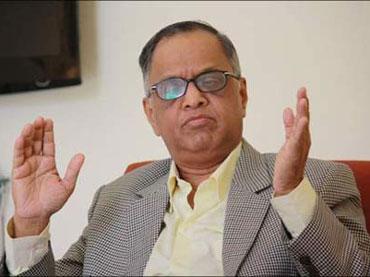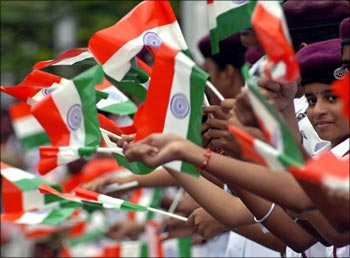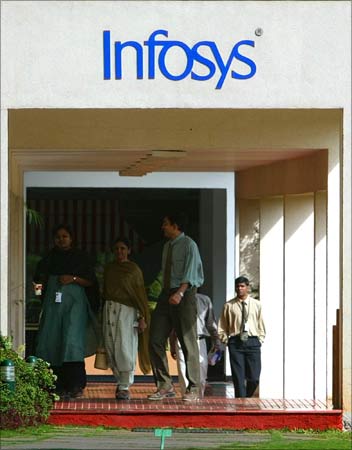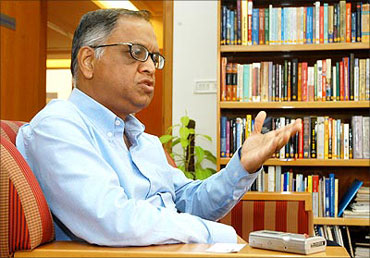 | « Back to article | Print this article |
Murthy on why India faces major problems
Software icon N R Narayana Murthy has blamed poor public governance for major ills faced by the country such as illiteracy, malnourishment, lack of sanitation facilities and dismal food and power management.
Even 63 years after Independence, 35 crore (350 million) Indians can't read and write. Twenty-five crore (250 million) people do not have access to safe drinking water, while 75 crore (750 million) have no access to sanitation facilities, Murthy said.
"The country has the largest mass of malnourished children, and 35 per cent of (total production of) grains are allowed to rot," the chief mentor of Infosys Technologies Ltd said.
He said India has an installed electricity generation capacity of 145 gigawatts but only 84 gigawatts are available, which is "sadly a shame".
Click NEXT to read on . . .
Murthy on why India faces major problems
"Lot of it is due to poor (public) governance. There is no doubt about it," Murthy said.
"Unfortunately, our public governance is inadequate. Whatever our public governance has touched has not made as good a progress as private governance has."
He said while all of private governance may not be good, private governance institutions have by and large done better because of competition, entry of multinational companies and the need to compete at the global level.
"This country requires discipline like no other country. We are like this because we are not a disciplined set of people. And that discipline has to start right in classrooms," Murthy said.
Click NEXT to read on . . .
Murthy on why India faces major problems
He said the information technology industry has earned India "a little bit of recognition" in the world, first time in 300 years.
"Today we are thought of as people who can indeed do something worthwhile. This was not so some 25 years ago. Indians (till three decades ago) were seen as people incapable of doing anything worthwhile. Wherever you went, you were looked down upon as people worthy of pity. But that scenario has changed a little bit thanks to at least one (IT) industry," he said.
'As a student, I attended all classes'
Murthy also condemned the tendency of students in resorting to rote with the sole aim of passing the examinations rather than attempting to learn and acquire knowledge.
"We have not leveraged the power of education. Our engineers have become people who learn by rote (a learning technique which focuses on memorisation), pass the examination and they are incapable of making a difference to the society," he said.
Click NEXT to read on . . .
Murthy on why India faces major problems
Speaking at an educational institute in Pune recently, he said the focus of students should not be on exams but on learning.
Recalling an interacting with three new employees of Infosys, he said he asked the computer science graduates a fundamental and basic question to which they replied they had "forgotten it all" since the exams got over.
"I was stunned by their answer," he said. "Please be disciplined. Don't bunk classes. As a student, I attended every one of my classes," Murthy said.
Click NEXT to read on . . .
Murthy on why India faces major problems
He said he has the "dubious distinction" of having been the only student who attended classes when there was a strike by the entire college.
"The reason was very simple. My father was a teacher and I know that if I respected my father, I have to respect every other teacher and if I have to respect a teacher, then I have to go and sit in the class," Murthy said.
"I can assure you that it has served me very well," he said.




